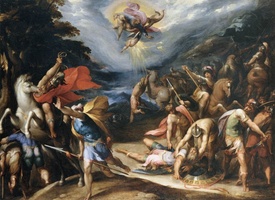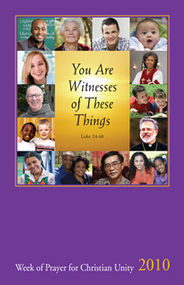If you want to know the reasons why the bishops and vicars of the Traditional Anglican Communion petitioned the Holy Father for full communion --which led to the motu proprio for the Anglicans (given on Nov. 4, 2009), then read their October 2007 letter. The It was recently published by a blogger of Anglo-Catholic sensiblities. Here it is...
Ecumenism: January 2010 Archives
Gladly will I glory in my infirmities, that the power of Christ may dwell in me.


Among the biblical readings from today's liturgy there
is the celebrated text of St. Paul's First Letter to the Corinthians in which
the Church is compared to the human body. The Apostle writes: "As a body
is one though it has many parts, and all the parts of the body, though many,
are one body, so also Christ. For in one Spirit we were all baptized into one
body, whether Jews or Greeks, slaves or free persons, and we were all given to
drink of one Spirit" (1 Corinthians 12:12-13). The Church is understood as
a body, which forms with Christ, who is the head, one single whole.
Nevertheless, what the Apostle wishes to communicate is the idea of unity in
the multiplicity of charisms, which are the gifts of the Holy Spirit.
Thanks to
these gifts the Church presents itself as a rich -- and not a uniform -- living
organism, the fruit of the one Spirit who leads all into a profound unity,
assuming the differences without abolishing them and realizing a harmonious
ensemble. It prolongs the presence of the risen Lord in history, especially
through the Sacraments, the Word of God, the charisms and the offices
distributed in the community. For this reason, it is precisely in Christ and in
the Spirit that the Church is one and holy, that is, an intimate communion that
transcends and sustains human capacities.
I would like to emphasize this aspect
while we are observing the "Week of Prayer for Christian Unity,"
which concludes tomorrow, the Feast of the Conversion of St. Paul. Following
tradition, I will celebrate vespers in the afternoon in the Basilica of St.
Paul Outside the Walls, with the participation of representatives from the
other Churches and ecclesial communities present in Rome. We will ask God for
the gift of the complete unity of all the disciples of Christ and, in
particular, according to this year's theme, we will renew the commitment to
being together witnesses of the crucified and risen Lord (cf. Luke 24:48). The
communion of Christians, in fact, makes the proclamation of the Gospel more
credible and efficacious, as Jesus himself said as he prayed to the Father on
the eve of his death: "That they may be one ... that the world might
believe" (John 17:21).
(Pope Benedict XVI, Angelus Address, January 24, 2010; Image of the "Conversion of Saint Paul" by Hans Speckaert)
Speaking of the Week of Prayer for Christian Unity, which begins today and lasts until the 25th, the Pope talked about the value of the prayer initiatives for the Week at the Sunday Angelus Address:


Every year it constitutes, for believers in Christ, a
propitious time to revive the ecumenical spirit, to meet each other, to get to
know each other, to pray and reflect together. The biblical theme, taken from
the Gospel of St. Luke, echoes the words of the risen Jesus to the apostles:
"You are witnesses of these things" (Luke 24:48). Our proclamation of the
Gospel of Jesus will be much more credible and effective the more that we are
united in his love, as true brothers. Thus, I invite parishes, religious
communities, ecclesial movements and associations to pray unceasingly, in a
special way during Eucharistic Celebrations, for the complete unity of
Christians.
Lord, pour out upon us the fullness of your mercy, and
by the power of your Spirit remove divisions among Christians. Let your
Church rise more clearly as a sign for all the nations that the world may be
filled with the light of your Spirit and believe in Jesus Christ whom you have
sent, who lives and reigns with you and the Holy Spirit, one God, forever and
ever. (from the Mass for Unity of Christians)
The work of bringing about the unity among Christians is a supreme priority for all Catholics, indeed, all Christians. In the 26+ year ministry of Pope John Paul II we saw this work unfold and advance in many unimaginable ways, as we did with previous popes, but John Paul recognized Christian unity as a fruit of the Holy Spirit. We were reminded the Church's priority for Christian unity at the beginning of Benedict's pontificate. The month of January 2010 we are asked by the Pope to keep this work in our sacrifice of prayer not because it is a "nice thing to do," but because it is a condition, that is, a premise, a stipulation, a prerequisite for Catholic faith and life. Let's recall a portion of what Benedict said at his inaugural Mass as Supreme Pontiff:
...image of the shepherd and that of the fisherman issue
an explicit call to unity. "I have other sheep that are not of this fold; I
must lead them too, and they will heed my voice. So there shall be one flock,
one shepherd" (Jn 10:16); these are the words of Jesus at the end of his
discourse on the Good Shepherd. And the account of the 153 large fish ends with
the joyful statement: "although there were so many, the net was not torn" (Jn
21:11). Alas, beloved Lord, with sorrow we must now acknowledge that it has
been torn! But no - we must not be sad! Let us rejoice because of your promise,
which does not disappoint, and let us do all we can to pursue the path towards
the unity you have promised. Let us remember it in our prayer to the Lord, as
we plead with him: yes, Lord, remember your promise. Grant that we may be one
flock and one shepherd! Do not allow your net to be torn, help us to be
servants of unity! (Pope Benedict XVI, Homily for the Beginning of the Petrine
Ministry, 2005)

